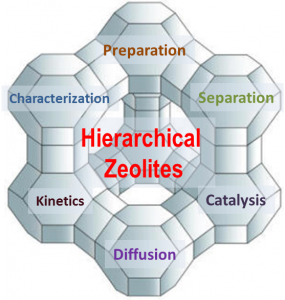Zeolites are crystalline aluminosilicates that possess uniform micropores (sub-nanometer size) and cavities, with dimensions that are close to those of numerous molecular species of high commercial interest. Accordingly, zeolites are known to exhibit molecular sieve and shape-selective properties, based on the diffusional access of guest species into their sub-nanometer size pores and associated shapes. Moreover, zeolites may incorporate a large number of heteroatoms in four-coordinated sites in the crystalline lattice and may also be used as supports for dispersed metals and metal oxides, conferring these materials with catalytic properties for a large variety of reactions. As a consequence, zeolites are solids with significant industrial applications as catalysts, adsorbents, and ion exchangers. Notwithstanding the positive effect of the presence of micropores with respect to shape selectivity, these micropores might impose diffusion limitation diminishing their accessibility to heavier molecules. The key objective of our research is to modify the pore architecture within the zeolites in a way that will allow the selective adsorption and/or the reaction of the desired molecules.
